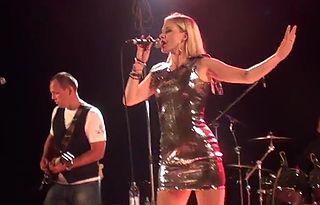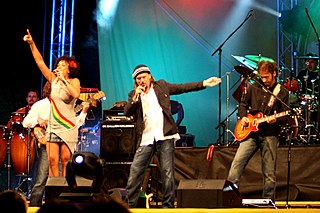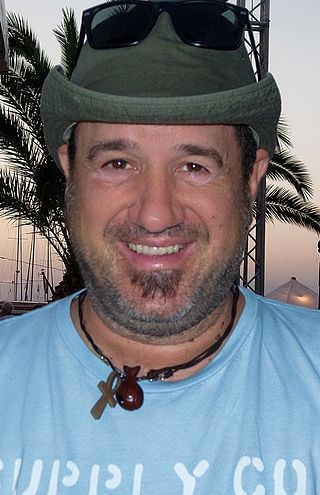
Ivana Ranilović-Vrdoljak better known by her stage name Vanna, is a Croatian pop singer.

Severina Vučković, better known mononymously as Severina, is a Croatian singer-songwriter and actress. In 2006, the Croatian weekly Nacional listed her among the 100 most influential Croats, calling her "the only bona fide Croatian celebrity".

Prljavo kazalište is a rock band from Zagreb, Croatia. Since its formation in 1977, the group changed several music styles and line ups but remained one of the top acts of both the Croatian and Yugoslav rock scenes.

E.N.I. or ENI is a Croatian pop band and girl group from Rijeka consisting of members Ivona Maričić, Iva Močibob, Elena Tomeček Zdjelar and Nikolina Tomljanović. The group debuted in early 1997 with their single "Probudi me" which was later chosen at Dora 1997 to represent Croatia at the Eurovision Song Contest 1997 in Dublin, Ireland. Their debut album Probudi me was released shortly after, in late 1998.

Darko Rundek is a Croatian rock singer, songwriter, poet, and actor. His music career started in the early 1980s, as the frontman of the world music influenced rock band Haustor. He emigrated to France after the Yugoslav wars started in 1991, and has recorded eight albums with various musicians from different parts of the world: Apokalipso, U širokom svijetu, Ruke, MHM A-HA OH YEAH DA-DA, Balade Petrice Kerempuha, Plavi avion, Mostovi and Brisani prostor.

Dragan Lukić Šegedin better known by his pseudonyms Lvky and Luky, is a Croatian singer, songwriter and music producer from Split.

Majke ("mothers") are a cult Croatian rock band. Founded in 1984 in Vinkovci, Majke were one of the many bands to appear in a town that had a particularly vibrant rock and alternative scene. The band started playing under the influence of bands like: MC5, Flamin' Groovies, Steppenwolf, The Stooges, New York Dolls, Motörhead and many others.

Damir Kedžo is a Croatian pop singer. While he started his career in 2003 by participating in Story Supernova Music Talents, he became even more famous in Croatia after winning the third season of Tvoje lice zvuči poznato, the Croatian version of Your Face Sounds Familiar. He also performed in musicals.

Bitanga i princeza is the fourth studio album by Yugoslav rock band Bijelo Dugme, released in 1979.

Let 3 is a Croatian rock band based in Rijeka, Croatia formed in 1987. The frontmen are Damir Martinović "Mrle" and Zoran Prodanović "Prlja". Particularly popular in the former Yugoslavia, the band is known for their original approach to rock music and their obscene live performances. Their songs often contain provocative and vulgar lyrics. They represented Croatia in the Eurovision Song Contest 2023 with the song "Mama ŠČ!".

Hladno pivo is a Croatian punk rock band. The recording act, fronted by Mile Kekin, remains one of the most popular rock bands in Croatia.

Antonija Šola is a Croatian musician, singer-songwriter, lyricist, actress and music producer. She is known for playing a main role of "Tina Bauer-Fijan" in first Croatian soap opera Zabranjena ljubav (2004–2008). In addition to her role in the series, she composed and wrote songs, and wrote the lyrics of the series' theme song. After a role in the series, she started her musician career, while also has worked on songs and album with numerous artists of Balkan Region.

Jelena Rozga is a Croatian pop, folk, and electropop singer. Born and raised in Split, Croatia, Rozga was a ballet dancer as a child. She rose to fame in 1996, when she became the lead singer of Magazin, a pop band famous in Croatia. She served as the band's lead singer until 2006, releasing a total of five studio albums. During the ten years, the band released numerous commercially and critically successful singles including "Ginem", "Minut' srca tvog" and "Minus i plus" among others.

Croatian popular music is the popular music of Croatia.

Psihomodo Pop is a Croatian pop punk group. The band was formed in 1983 in Zagreb and has since achieved a somewhat cult following across the area of former Yugoslavia.

Korni Grupa was a Yugoslav rock band formed in Belgrade in 1968.

Nenad "Neno" Belan is a Croatian rock musician known as the frontman of Đavoli, as well as for his solo work.
Laufer was a rock band from Rijeka, Croatia that was active between 1986 and 1996. They were briefly active again after 2003.

Denis & Denis was a Croatian and Yugoslav synth-pop group formed in Rijeka in 1982. Formed as a duo consisting of keyboardist and vocalist Davor Tolja and vocalist Marina Perazić, Denis & Denis immediately gained attention of the Yugoslav audience with their first recordings broadcast on Yugoslav radio stations. Their debut album, Čuvaj se!, released in 1984, brought them nationwide popularity, Perazić becoming one of the biggest sex symbols of the Yugoslav rock scene. Their second album, Ja sam lažljiva, was recorded during Tolja's military leaves from the Yugoslav army, so for the live performances he was replaced by Edi Kraljić, his former bandmate from the band Linija 32. Ja sam lažljiva brought new hits and increased the group's popularity. After Tolja's return from the army, the group continued working as a trio consisting of Tolja, Perazić and Kraljić. After Perazić left the group in 1986 to start a solo career, Tolja and Kraljić continued working as Denis & Denis, turning towards pop rock sound. After the release of the album Budi tu in 1988, the group disbanded, Tolja dedicating himself to work in studio.

Boris Štok is a Croatian singer and songwriter. He is most known as the lead vocalist for the rock band Quasarr. Štok began to establish himself as a solo artist with the release of the single "Voli me još ovu noć" in 2017. In October 2017, Štok released his debut EP Puls through Aquarius Records. Shortly after, in 2018, his debut album Ispod kože was released. In 2019, the album won him a Porin award in the category Best Alternative Album.



















